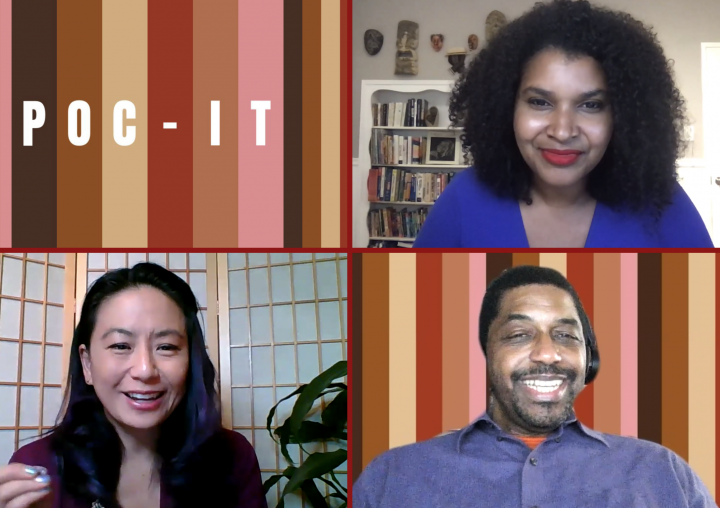On Nov. 4, Stanford People of Color in Technology (POC-IT), rolled out the virtual red carpet for two powerful speakers. Stacy Kirk is a Stanford graduate, entrepreneur, and CEO and founder of QualityWorks Consulting Group, a top-rated software consultancy, and CEO of Posture, which helps healthcare organizations establish HIPAA compliance programs. Dr. Helen Hsu is a clinical psychologist at Stanford Counseling & Psychological Services, a lecturer at Stanford, and past president of the Asian American Psychological Association.
The talks provided two different but equally insightful perspectives on achieving IT career goals.
Taking the next step
Stacy talked about her career journey, the challenges of being a Black female technologist in an organization where there was nobody else like her, and the decision to become an entrepreneur.
While following your passion sounds wonderful, according to Stacy, following your strengths is often more productive. Her advice: understand what you do well and map those skills to opportunities.
“It wasn’t until I became an entrepreneur and I opened and grew my own company and hired my own team that I really found that passion,” she said, adding that “my success ignites my passion.”
Keys to being promoted
For those who want to move up the ladder, Stacy maintains that hard work, while a positive attribute, is rarely the determining factor for who gets promoted. More often than not, it comes down to “who knows you and is your advocate.”
With that in mind, Stacy offered tips on how to stand out in the workplace:
- How people perceive you is important, so work to build your brand.
- Emphasize your accomplishments instead of your skills.
- Find someone you can learn from and ask them to be your mentor.
- Develop strong emotional intelligence. This is important—even for those who work in technology.
Holistic professional growth
Helen emphasized the importance of holistic professional growth. While IT professionals often invest in gaining technical skills, Helen points out that it’s equally important to work on two other factors that can make you an outstanding job candidate: adaptability and emotional resilience. With this, you can distinguish yourself as someone who can competently manage new and unexpected challenges.
To illustrate adaptability, Helen shared an analogy of standing in the ocean during rough waters.
“You can stand there and get walloped by waves that are going to come—and in a year like this one they may come from multiple directions at once—or figure out how to fashion a (surf) board or a boat and at least stay on top of what might still be a rough ride,” she explained.
Manage difficult emotions mindfully
Being emotionally resilient often means being flexible and adapting to circumstances instead of being controlling and rigid. For those who find it difficult to overcome the types of emotions that can hold you back, Helen offered six steps for mindful reflection:
- Become aware of your emotions and learn to accept them.
- Identify and label your emotion.
- Accept your emotion.
- Realize the impermanence of your emotions.
- Inquire and investigate; ask yourself why you feel a certain way.
- Let go of the need to control your emotions.
A few more thoughts
Steve Gallagher, Stanford CIO and Rodney Carter, POC-IT program lead both provided inspiring opening remarks, but it was Rodney who concluded the event with an important reminder for all: take care of your loved ones, yourselves, and your soul.
View event recording l View slides
Resources
Check out these recommended resources for building adaptability and emotional resilience:
- Download the Driven app – Six Domains of Resilience
- The Gottman Institute – Surfing Uncertainty
- Stanford Vaden Health Services: Counseling and Psychological Services (CAPS)
- Tiny Habits: The Small Changes that Change Everything (Dr. BJ Fogg, Director, Stanford Behavior Design Lab)
- STOPP Video (Dr Marissa Nunes Moreno)
- Anxiety Toolbox, Part One (Dr. Lindsay Ellch)
- Anxiety Toolbox, Part Two (Ariana Davidson, LCSW)
- The Psych Show Channel with Dr. Ali Mattu
- Download Headspace app,
- Stanford Faculty Staff Help Center
- Maximize Your Mind Body Health (Dr. Helen Hsu and Dr. Marissa Floro)


